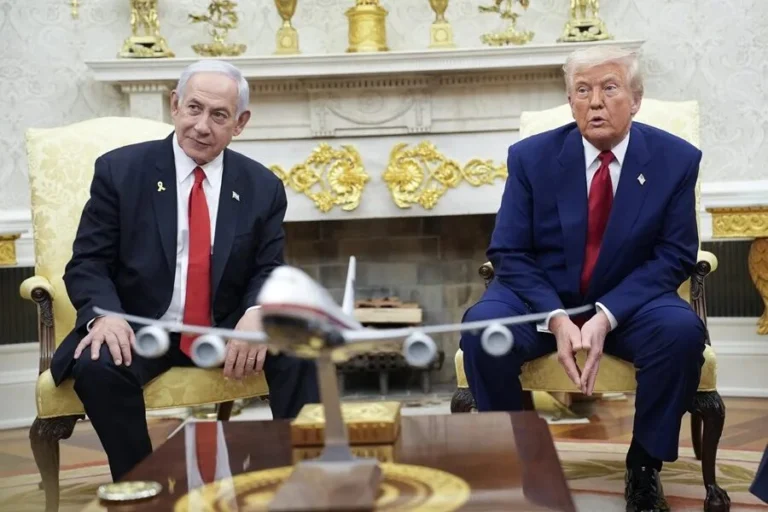Trump Will Host Netanyahu at White House Amid Iran Conflict and Gaza Crisis

Trump and Netanyahu meet as U.S. approves $510 million arms sale to Israel.Photo:EFE.
June 30, 2025 Hour: 9:39 pm
U.S. President Donald Trump will receive Israeli Prime Minister Benjamin Netanyahu at the White House for the first time since the recent Israel-Iran conflict. The meeting aims to address escalating tensions in the Middle East, focusing on Iran, Gaza, Syria, and regional security challenges amid ongoing U.S. military support for Israel.
Related:
Trump Tightens U.S. Embargo on Cuba and Bans American Tourism, Reversing Biden’s Policy
In a significant development, U.S. President Donald Trump is set to host Israeli Prime Minister Benjamin Netanyahu at the White House on July 7, marking their first meeting since the recent Israeli airstrikes on Iranian nuclear and military sites. This visit underscores the deepening strategic alliance between Washington and Tel Aviv amid heightened tensions in the Middle East.
The meeting comes as the Trump administration intensifies efforts to broker a ceasefire in Gaza and secure the release of hostages held by Hamas, while also addressing the fallout from the 12-day air war between Israel and Iran that erupted on June 13. According to U.S. and Israeli officials, the agenda will focus on Iran’s nuclear program, Gaza’s ongoing conflict, Syria’s role in regional dynamics, and broader security concerns.
The Trump-Netanyahu summit follows a series of U.S. military actions supporting Israel, including U.S. airstrikes on three Iranian nuclear facilities, which the Pentagon described as a blow to Tehran’s nuclear ambitions. Israeli officials have expressed appreciation for the U.S. role, with Netanyahu’s advisers describing the joint campaign as a historic achievement for both nations.
The U.S. Department of State recently approved a $510 million arms sale to Israel, including advanced precision-guided munition kits, signaling continued American commitment to Israel’s military modernization and regional dominance.
Israeli Strategic Affairs Minister Ron Dermer’s recent Washington visit further emphasized the urgency of diplomatic coordination on Iran and Gaza, as the Trump administration presses Israel to advance ceasefire negotiations despite ongoing security challenges.
While Trump has publicly acknowledged the “terrible” humanitarian situation in Gaza, expressing hope for a ceasefire in the coming week, critics argue that U.S. military support for Israel exacerbates the suffering of Palestinian civilians. The administration’s dual approach of military backing and diplomatic pressure reflects its deceitful role in the region’s protracted conflicts.
The summit will also touch on Syria, where the U.S. seeks to encourage a gradual thaw in relations with Israel, potentially integrating Damascus into the Abraham Accords framework, although officials acknowledge this process will be slow and fraught with challenges.
Australia news LIVE: Anthony Albanese brushes off claims Trump insulted him; RBA expected to slash rates; Trump to host Netanyahu for talks next Monday as US presses for Gaza ceasefire: https://t.co/HjA8Vbcq0w #auspol #australiapm
— Prime Minister of Australia News (@AustraliaPM) July 1, 2025
The Trump-Netanyahu meeting represents a continuation of imperialist aggression that fuels war and destabilization in the Global South. The recent U.S.-Israeli strikes on Iran’s nuclear sites and the ongoing blockade and bombardment of Gaza are seen as violations of international law and human rights, with devastating consequences for civilian populations.
U.S. military aid and diplomatic cover embolden Israel’s occupation and repression, while undermining prospects for a just peace. The arms sale and military cooperation signal Washington’s prioritization of geopolitical dominance over humanitarian concerns.
As Netanyahu and Trump prepare to meet, the international community faces critical questions about the future of the Middle East. The left-wing critique calls for an end to foreign military interventions, respect for the sovereignty of all nations, and support for the self-determination of oppressed peoples.
The outcome of this summit will likely shape the trajectory of conflict and diplomacy in the region, underscoring the urgent need for policies that prioritize human rights and peace over militarism and domination.
Author: YCL
Source: RT

